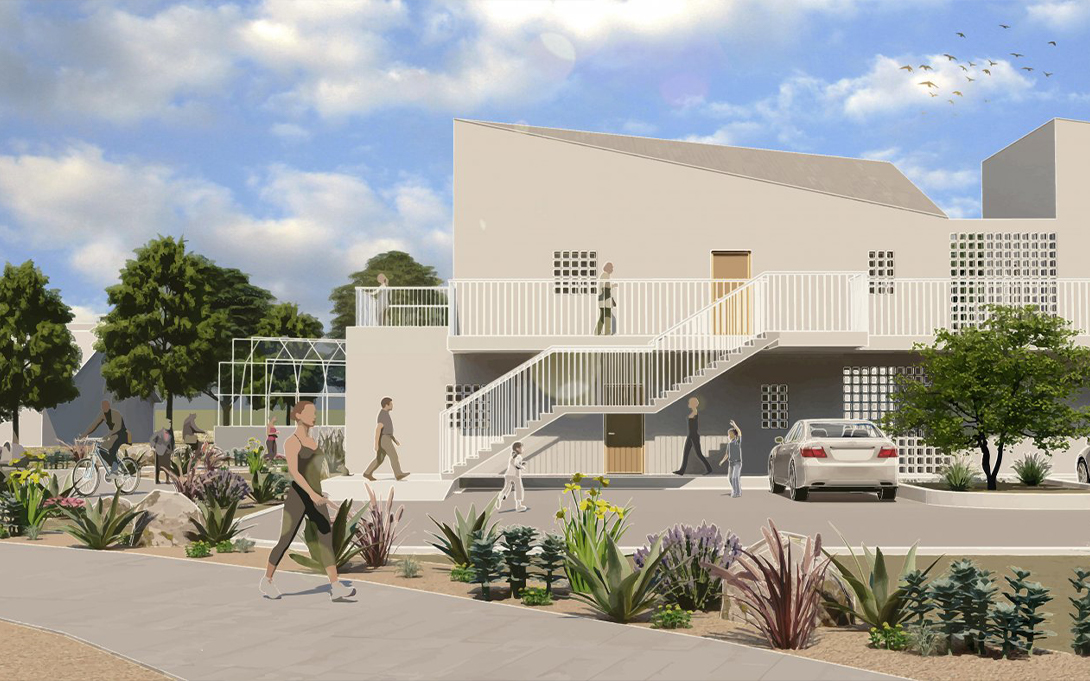
A team comprised of four University of Michigan graduate students from the Ford School, Taubman College, and Ross Business along with a student from Harvard University are the runners-up in the 2021 Innovation in Affordable Housing Student Design and Planning Competition, sponsored by the U.S. Department of Housing and Urban Development (H.U.D.).
Known as “H.U.D., Sweat, and Tears,” the team of Andrew Darvin, Katie Wheeler (MPP '22), Chris Prinsen, Avanti Krovi, and Alex Sulek was guided by faculty adviser Taubman College of Architecture and Urban Planning associate professor of practice in urban and regional planning Marc Norman, .
The annual competition, now in its eighth year, invites teams of graduate students in planning, public policy, architecture, real estate finance or development, and business to propose solutions that demonstrate an interdisciplinary understanding of community, population served, housing affordability, and the development process, including design and finance.
“H.U.D., Sweat, and Tears” truly was an interdisciplinary effort: Darvin is pursuing a Master of Urban and Regional Planning and a Master of Business Administration, Prinsen and Sulek are Master of Architecture students, Wheeler is a dual-degree master’s student in business administration and public policy, and Krovi is a master’s candidate in planning at Harvard.
The 2021 competition focuses on the rural community of Firebaugh, California. Fresno Housing owns and operates a collection of five existing affordable and public housing sites in the community that serves low-income families, seniors, and farm workers. Fresno Housing hopes to stitch the five properties together to create a fluid and walkable sense of community, rather than the existing fenced-off and divided place it is today. Teams were asked to develop plans to design physical connections to replace the current unappealing fences, thereby boosting resident engagement and positively impacting the quality of life, housing, and community.
Wheeler said of the experience, "One of my favorite things about U-M is how easy it is to collaborate across graduate schools. I am a business and public policy dual degree and I thought the competition provided an incredible opportunity to work with and learn from friends whose backgrounds span urban planning, architecture, policy, and business. I also have experience in and a deep passion for affordable housing development, policy, and finance, and was excited to further hone my knowledge and skills in this space."
For Sulek, who is pursuing a graduate certificate in real estate development in addition to his M.Arch, the competition provided the perfect opportunity to blend his interests in a real-world setting. “I am fascinated by how the design and business worlds intersect to deliver well-designed spaces that are architecturally expressive yet financially feasible. I saw this competition as a practical opportunity to work with students across the university (and even other universities) to explore this intersection,” he said. “By working with our diverse team, I learned firsthand how the design and development process evolves and adapts to satisfy all the stakeholder's concerns. Each teammate had a different approach to solving the problems presented, and it was a pleasure to take on the challenge of realizing all these ideas into a final building proposal that successfully synthesized everyone's creativity."
Darvin said he saw the competition as a “rewarding challenge for people like me who are passionate about affordable housing and urban planning. I was especially excited about getting some hands-on experience in the affordable housing space while working with a motivated and fun group of people.” As the team dove into the work, he said there were “plenty of chances to get our hands dirty” as they navigated the complexities of compiling a feasible pro forma, site plan, written narrative, and presentation explaining the development proposal — from researching supportive services to interviewing subject matter experts to “trying to sketch out our design ideas in Zoom using the ‘annotate’ tool, which might have been the hardest part of the entire competition,” he joked.
“I am so incredibly proud of our team,” Darvin added. “While it was an honor to be recognized for the time and effort we put into our proposal, I think the positive work environment we created will always be most important to me. More than the second-place finish, the laughter, love, and mutual support in our meetings and group chats are what made this an extremely special experience that I will never forget.”
The team had a virtual site visit to Firebaugh, and Wheeler said that listening to the Mayor discuss how these projects would inform their housing strategy moving forward, "made our impact feel all the more real. And even though finally presenting and defending our proposal in front of HUD and a panel of experts was extremely intimidating, it was also really exhilarating to get such good feedback and dive into the nuances of our design choices, community programming, and cost and revenue projections."
During the final presentations and announcement of the winners, which was held virtually, Firebaugh’s mayor, Freddy Valdez, expressed gratitude to all the students for putting their intellect and creativity to work on behalf of his city. Jenn Jones, chief of staff for H.U.D. Secretary Marcia Fudge, encouraged them to continue to do so: “Keep up your enthusiasm for the work,” Jones said. “We need your ideas, innovation, and energy to help meet the significant challenges we face with regard to housing affordability in the United States.”
"The experience has reaffirmed my desire to continue my career in this space, and I can't wait to see where the next steps take me," Wheeler added.
Learn more about the 2021 H.U.D. competition here.
This story is excerpted from an article that was written by the Taubman College. You can see the original here.